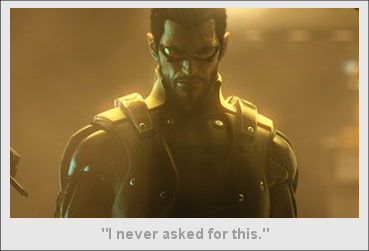
The Complexity of Modern Games
by best_Alchemist on Comments
A few days ago, I finished up playing the newly released title: Deus ex: Human Evolution. The game has you assume the role of a corporate chief of security named Adam Jensen. The corporation he happens to be working for goes by the name of Sarif Industries, which specializes in the manufacturing of human enhancement technology called augmentations. These augmentations give human's extraordinary abilities akin to what a comic book super hero might have. Adam Jensen involuntarily finds himself in a situation where he has to forfeit his natural body in order to receive augmentations, which ultimately is for saving his life. The game focuses on a dystopian view of the world in which the ethics of human advancement through the use of science and technology is shrouded in a great deal of ambiguity and uncertainty; world governments wildly use technology to monitor and control the population and regulate these augments which are now widely dispersed among everyday citizens. Throughout the game, you are presented with a considerable amount of choices, some ranging from the point of entry into a building you decide to go with, to what your ideological views are of augmentations in general. The game itself was fairly amusing, but I noticed a kind of trend that was appearing more often in some of the games these days, especially western games. The fact that the choices are becoming complex, more open ended, and how the goal of the game isn't always clearly defined. I've seen games in the past that had similar engaging stories, but they mostly required you, the gamer, to take on a more passive role and to just sit and watch the events unfold.